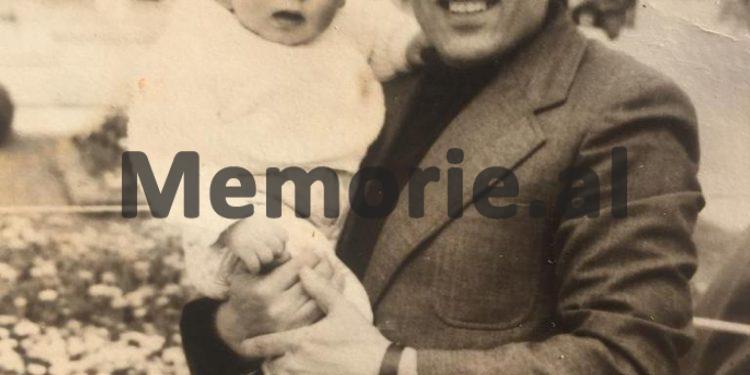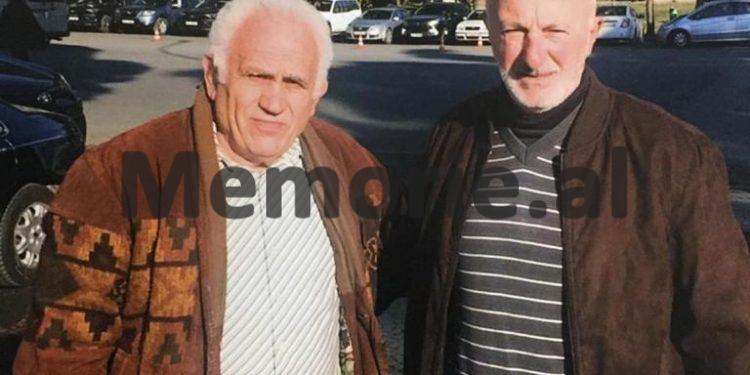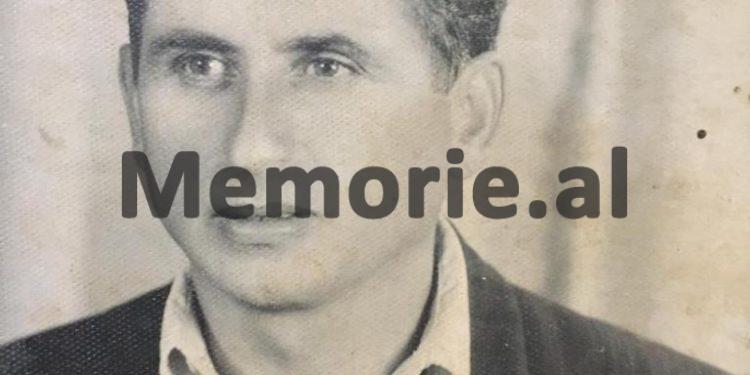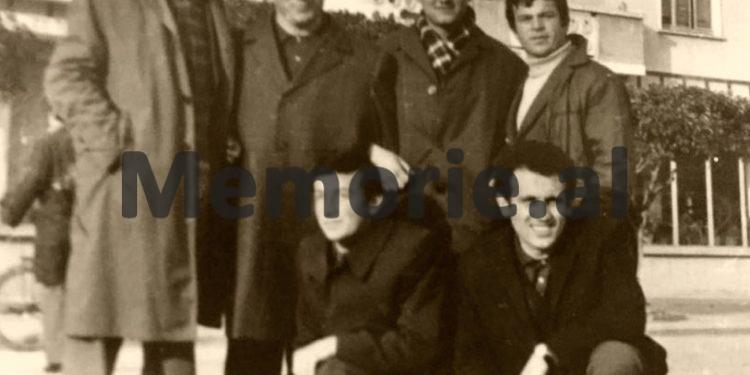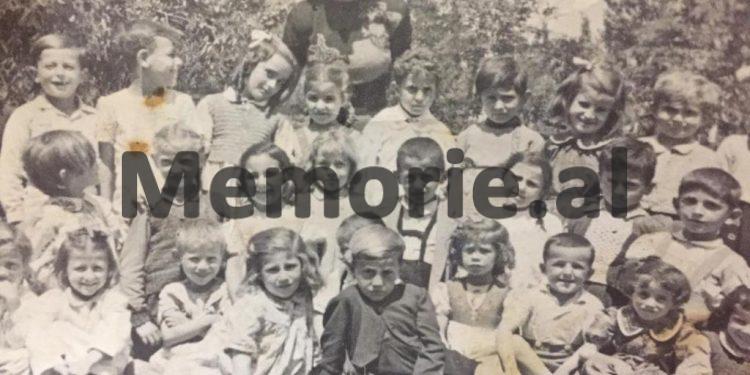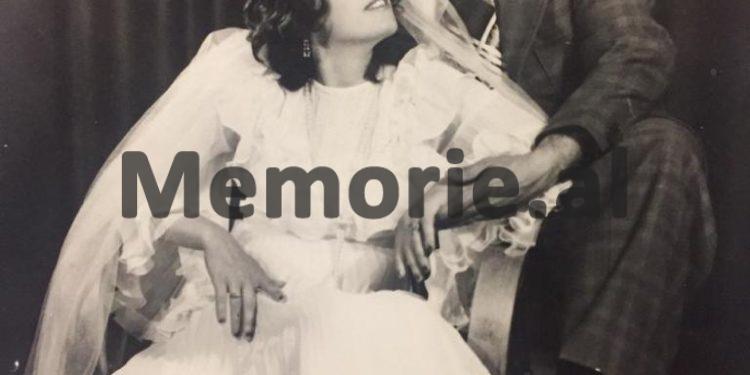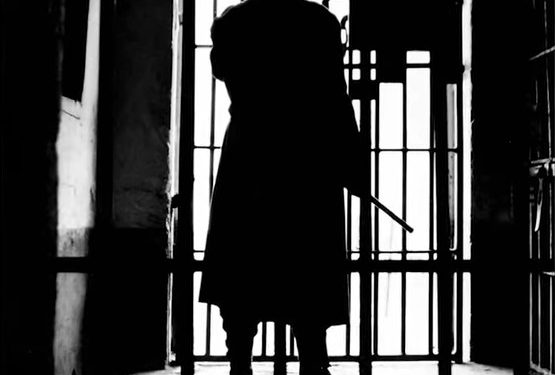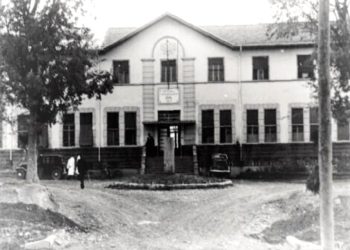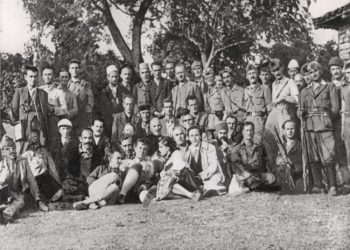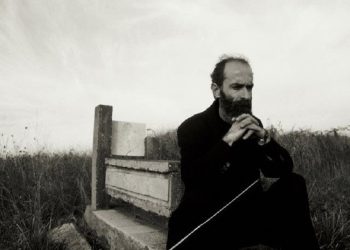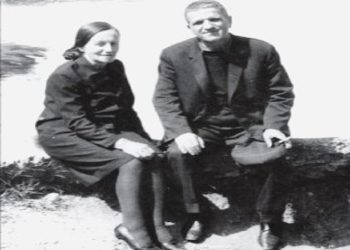Saimir Maloku
Part eight
Memorie.al/publishes some of the unknown stories of Sajmir Maloku, a former military engineer who graduated with a ‘Gold Medal’ at the University of Tirana, who was arrested by the State Security on May 13, 1976, in the presence of 600 people in a large movie theater in the city of Burrell, accused of being a “potential agent of British Intelligence and of agitation and propaganda against popular power and the communist regime.”
Regarding the real reason for his arrest, Sajmir Maloku testifies: “Because the Albanian Public Television broadcast only 4 hours of television broadcasts per day, I in 1970, reading a lot of foreign scientific literature, managed to build a simple electronic television device (converters of UHF Band to VHF TV signals). This invention of mine made it possible for the Albanian people in the future to watch freely the shows of the Italian and Yugoslav television stations of the UHF Band, especially in the mountainous and coastal areas of our country.
The first question the investigator asked me in the first investigative session was: “You are a famous Western spy, just like Mata Hari. “Tell us, you filthy enemy, your agency activity with the Secret Agencies of 17 Foreign Countries of the West and the World”. This is because the State Security had great doubts about my meetings with foreign tourists over 8 years and the numerous postal correspondences with philatelists of the above countries. Today this investigator is alive.
During a search of our home in Tirana and my hotel locker in Burrell City, State Security found and retrieved the Holy Books of the Bible and Quran in English; many old English books and magazines; some dictionaries and blocks with sketches of modern television antennas; my electronic TV equipment with two transistors and TV signal amplifier; etc “.
All these and other events of his life, from: childhood, schooling, period of youth with life in Tirana in the early ’70s, pursuit and surveillance by the State Security, graduation, appointment as a military liaison engineer in a department of Burrel, arrest, trial and public unmasking, investigation, prison, etc., Sajmir Maloku has summarized in a book entitled “HOW I SURVIVED IN THE COMMUNIST HELL” (Publication of EMAL in Albanian and English), parts of which he has given for publication exclusively for Memorie.al
Continued from the previous issue
After ten minutes this very irritated policeman and informed about the humane action of me and my co-worker, wanted to punish us both. Together we told the policeman: “You should thank us for our action, that if the convict had died of a cold, you would have been arrested for violating the rules of procedure and you would have been fired. from work. Do you think that you would have left your family and children without bread?”
“Final work in Spaç galleries had disfigured the prisoners”
It was a real horror, because the vapors of sulfuric acid and the high temperature of the working front in the pyrite galleries and the impurities of the body, made it difficult and severely damaged the health of the prisoners. There was no water to wash in front of the work, but only in the prison bathrooms. It was a real horror when you saw the prisoners coming home from work with those blackened faces and all the dust and old unwashed clothes. Only after they were washed could you discern their true face. Extremely tedious work and for many years in the mining galleries, poor nutrition and psychological shock, had disfigured the faces of the prisoners who looked older. The dust of the galleries and their poor ventilation as well as the acid vapors had severely damaged the lungs of the prisoners and often causing them to develop silicosis (quartz powder in the lungs).
Political prisoners, both on their way to and from work, formed long columns of two and, handcuffed, passed through the iron gate separating the prison and the mine. There was also a count of prisoners on suspicion that he had not escaped or that any of them might have died in the mine. Spaç prison was surrounded by many barbed wire fences. And above there were electrified wires. This made it impossible for any prisoner to attempt to escape. I saw with my own eyes how a prisoner out of desperation and terrible suffering jumped over the barbed wire fence of the prison. And the end was very fatal for this comrade, who had the aspiration of life, but communism took it at the height of his age. There were about 1,200 political prisoners. It is noteworthy that in all prisons political prisoners helped each other a lot. They were quiet prisons. The behavior of the prisoners towards each other was exemplary and very friendly. As soon as we entered the Spaç Prison Prison and worked in the mine galleries, some police officers told us political prisoners: “You have come to a place where you have to wake up when you do not want to wake up; to eat food when you are not eating; to work when you do not want to work, to sleep when you do not want to sleep. They also told us: “Work as hard as you can, because that way you are re-educated through work, so that you are worthy of society when you are released from prison.”
“Political prisoners in Spaç Prison were ‘slaves of the communist state”
In Spaç Prison, political prisoners were “slaves of the communist state”, who were forced to work for very low wages and in three shifts. The salary a political prisoner received for work done in the mine was as much as one-tenth the wages of a free mine worker. This was a great discrimination that the communist regime inflicted on political prisoners and forced them to work there in violation of international law. If you objected, the thug and the cell waited. This prison and mine were at an altitude of about 1000 meters above sea level. The winter there was very cold and temperatures reached -17 degrees C. It often snowed and rained. Prison – Spaç labor camp, reminiscent of the Russian Gulag or forced labor camps in Siberia during the communist dictator Stalin. So, the Russian communist experience was implemented by the dictator Hoxha in Albania, in Spaç Prison.
Political prisoners and the Western media referred to the Spaç Prison as the “Albanian Auschwitz and Gulag” because it reminded us of the Auschwitz Concentration Camp in Poland and the horrific Internment and Compulsory Labor Camps set up by dictator Stalin in Siberia of Russia. The copper and pyrite mine galleries were primitive and old. Political prisoners worked in extremely harsh conditions and where the temperature inside the pyrite gallery reached up to 40 degrees C. Sulfuric acid vapors and gallery dust severely damaged our lungs. If three freelance workers had the daily norm of extracting 2 or 3 wagons of copper or pyrite ore, the political prisoners of Spaç were forced by the police to extract 12 to 20 wagons filled with ore.
Some of the political prisoners, who were terrified by the poor condition of the mine galleries and the rather high daily rate of work, deliberately broke or severely damaged their feet, hands or toes, to avoid working in the mine. Failure to comply with the daily norm was punishable by imprisonment by the prison police in one of the ten cold cells for up to one month. There were many instances when police officers, who were the leaders of labor brigades where each had nearly 50 political prisoners at the entrance to the tunnel of the copper or pyrite mining galleries, punished many prisoners by placing metal handcuffs on their hands. The reason allegedly they had not realized the working norm, they kept the prisoner tortured by the cold, getting sick and wearing a thin jacket for four or five hours between winter and night where the temperature was minus 10 degrees and it was snowing or raining.
There were cases when over 1000 political prisoners, the prison police punished them for any reason even small, keeping them on the large concrete terrace of the bathroom, private kitchen, for more than an hour during the time of appeal. All the prisoners stood there in the middle of the rain and the snow or the great heat, because it was a form of communist re-education used by the Police, that is, as a punitive measure against them. While 1200 political prisoners lived in a large four-story palace. In each room with dimensions 6 x 5 meters lived 54 people accommodated in shared beds with three floors. The width of the straw mattress was small. Day and night the door and the windows of the room remained open. Insects, such as bedbugs, fleas and fleas, were plentiful and a source of infection in the bedrooms.
“Spaç revolt that started on May 21, 1973”
The transfer of prisoners from one prison to another was done by a notorious car called the auto burg. It was an old car, too isolated and without windows. Above the ceiling was a large enough hole to let in some air and natural light. It transferred up to 20 prisoners. Going by bus to Spaç Prison was a real hell from the long and bad mountain road as well as through a big mess due to the great lack of air. Many prisoners fainted or suffocated while their hands were tied with metal handcuffs locked with a padlock. We, when we rode, called this the “death machine”. Spaç Prison has a glorious day, that of May 21, 1973, when 700 political prisoners organized the first political revolt against the communist regime in Albania. There they raised the national flag without a star. This is because the star was the symbol of communism. The revolt, which lasted three days, was violently suppressed by the Police. Four political prisoners were sentenced to death, while 78 others were re-sentenced to an additional 10 to 25 years in prison.
This revolt raised the authority and dignity of the prisoners and the persecuted political class in our country and in the world. By order of the Spaç Prison Command, all political prisoners were obliged to listen for an hour to reading the books of the dictator and the Criminal Code of Albania. This was done to re-educate us with the communist ideology, where many slogans of this category had filled the walls of prison buildings. Even today there are many slogans. Many political prisoners died each year from the collapse of the mine’s extremely primitive galleries, where the front of the work was 500 to 1,000 feet from the beginning of the gallery entrance.
“The phenomenon of re-sentencing in Albanian prisons and Sami Dangëllia who suffered for 43 years”!
The people who died were buried by the police in a meadow near a stream and did not put any name or sign on the grave, but only inserted a glass jar with a lead plate and a number inside it. This jar was placed by the Police together with the corpse inside a simple coffin. The family could retrieve the remains of deceased relatives only after they had completed the years for which he had been convicted. So political prisoners had to serve their sentences even when they were dead. This funeral act showed how cruel, arrogant and inhumane the communist regime was, which was also feared by its dead political opponents and to instill fear in the people. The atrocities committed by the communist regime against political prisoners in prisons were innumerable.
It is worth mentioning the phenomenon of the second political re-conviction that occurred with dozens of political prisoners from Spaç Prison, Burrel, Qafë Barit, Ballsh and others when on the day of their release they had just left the prison door, were they put the metal handcuffs back in their hands and were arrested and re-convicted for the second time by the courts of the respective districts or in Tirana. There have also been cases where political prisoners have been re-sentenced for a third time inside the prison. For this the State Security through the prison operative had recruited some political prisoners with low vices as their accomplices. They in any case appeared as false witnesses in these retrial trials fabricated by them. They were allegedly convicted of agitation and propaganda or of imaginary escape plans. Some have been re-sentenced for the third time to 10 years in prison. There were some shocking figures of the prison years for Spaç prisoners such as the case of Sami Dangëllia born in 1926. On October 8, 1944 he, at the age of 18, was imprisoned by the Communist Party without being released. country. He served his sentence until his death on April 23, 1987, in Spaç Prison after 43 years in prison. Sami Dangëllia is the hero of suffering and the man who suffered the most in political prisons during the communist regime.
“Well-known clerics and intellectuals who suffered in communist prisons”
This is an unprecedented case in the former communist countries of Eastern Europe and the Balkans. Also, in the savage communist prisons, many honorable Catholic priests were serving my sentence with me: Dom Mikel Koliqi (Cardinal), Father Zef Pllumi, Dom Ernest Troshani (Cardinal), Dom Frano Ilia, Dom Ndoc Sahatçia, Dom Simon Jubani, Dom Nikolë Mazreku, Hoxhë Sabri Koçi etc. All of these religious clerics were honorable people and innocent victims whom the communist regime condemned and exiled to prisons for 20 short years. All political prisoners respected these revered clerics as if they were their parents or spiritual teachers.
In Spaç Prison I had known and made many friends with wonderful people such as: Eqerem Kavaja, Ylli Komti, Fatos Lubonja, Eduart Ypi, Maksim Velo, Perikli Gusho, Shpëtim Stërmasi, Aleksandër Isaia, Spartak Ngjela, Seit Vorpsi, Hafiz Sabri , Burhan Kalaja, Zyhdi Morava, Gëzim Vojka, Zyber Naçi, Roland Koçaj, Apollon Zenuni, Ludovik Vuka, Hysen Xhani, Estref Kërçiku, Kujtim Xhaja, Xhevat Alibali, Maksim Rama, Zenel Drangu, Gëzim Çela, Myslim Gjin, Myslim Gjin, Alizoti, Lulzim Shala, Sulejman Osmani, Agim Kodra, Agim Dika, Abdurrahman Pilkati, Fatbardh Frashëri, Frederik Shestani, Simo Jorgji, Maksim Rakipi, Hiqmet Myzyri, Lulzim Beqiri, Fadil Lami etc.
The road to the Prison – Spaç Mine was very dangerous, narrow and very bad. Our families who came once every two months from Tirana, to meet us political prisoners for only 30 minutes, had to travel for hours riding on the trucks that transported the ore of the Spaç mine or came by car – taxi with high prices. It is worth mentioning a very tragic and painful event told to us by a friend of ours from Spaç Prison, who worked in the mine with us. He and his brother were convicted for no reason by the communist regime even of being accused of spreading and listening to decadent Western music in order to overthrow the power of the people. The State Security for revenge, that the father of these two brothers had fled abroad, charged the two sons with the above two false charges as an additional charge. The two brothers with the surname P. from the horrific violence and torture, were forced to admit to the investigator such an accusation. When they appeared in court, they stated that they had not heard or seen Western music concerts because in the remote village where they had been interned for many years, there was no electricity, no radio, no television, no gramophone and no hand-held radio. But the trial panel, despite their statements in court, sentenced our friend to 20 years, while his brother to death. These are the biggest wonders in the world of the crimes of the Albanian communist courts.
“My inventions’ in the camp – Spaç prison, with electro-technical equipment”
In the Spaç mine I worked in the most difficult and remote sector and realized two or three daily work rates every day. I made this sacrifice to help my elderly and sick parents financially in Tirana. While working in the Spaç mine, I built and installed a sound center and a powerful electric sound amplifier as well as a radio, using obsolete radio equipment. These obsolete electrical materials were in the prison warehouse and in the Spaç mine. In addition to my work in the mine I in a rather small room of an old warehouse, made it like a radio technical laboratory. For this purpose, my family in the next meeting brought many professional work tools purchased in Tirana such as measuring instrument, small welding machine, tin, pliers, screwdrivers, TV lamps, etc.
These electrical materials and tools were allowed to me by the Spaç Prison Command. So, I put my scientific knowledge to help and spiritually enliven the political prisoners of Spaç. By installing 10 powerful speakers, I realized the wish of all political prisoners in Spaç, that is, to listen to music or news editions on the radio, while they were going to their place of work, almost 1.5 kilometers away from the mine area, or when they returned to prison. In my spare time, I maintained two television sets to watch Spaç political prisoners. Because at night the mains voltage was 140-160 volts, so too low, I built two autotransformers, which regulated the mains voltage to 220 volts. These TVs were the most beloved thing for the 1200 political prisoners, so I cared for them as much as possible. I, as an electronic engineer, also for Radio Communication, to exploit the phenomenon of feding, I had placed a large antenna in the direction of Italy on the prison radio. This caused the strong waves of the Radio – Italy station to interfere in the Radio Tirana station in the evening.
So, I managed to get the prisoners to listen to enough songs and news in Italian, often until the radio closed at 22.00. Most pleased about this were the venerable priests, who spoke Italian quite well and were informed by the news program about the political situation in the world and mainly in Western countries. Due to the rugged mountainous terrain, the television waves of the Albanian Radio Television were weak. So, I built two powerful TV antennas at the Mine workshop. This improved the appearance of the image and the sound on both television sets of Spaç Prison. I also maintained three television sets for prisoners. This initiative of mine made me enjoy the respect of the prisoners, and why not even that of the police personnel. I, turning a small speaker into a microphone, made it possible for the Prison Command to notify prisoners of meetings with their families even when they were at their place of work near the mine or for other announcements. This helped a lot of our families not to wait for hours until we met our people who were in Spaç Prison.
“How did I manage to save the life of the accomplice who drank metallic alcohol”!
At the Spaç mine, I managed to save the life of prisoner P. S. He mistakenly drank about 400 grams of methyl alcohol in the eyes of the police guards at the mine office instead of a water bottle. (Methyl alcohol is an extremely powerful poison. Only 50 ml or grams are consumed from this substance and the chances of dying are 95%). I quickly did almost 12 transfusions and mouthwashes with warm soapy water, using the large metal car fuel hopper. After that, opening the mine ambulance bag, I made a syringe with two doses of adrenaline in the heart. I quickly placed two bottles of serum in the veins of my hand and the rubber tube of the oxygen cylinder in my neck and mouth (this cylinder was used for welding). Then, the eighth of us transported the injured person on a stretcher for about two kilometers on a mountainous terrain to Spaç Prison. I held the serum bottle tied to the veins of his hand, while three others carried the heavy oxygen canister of the office, while four of us were transporting the injured prisoner on a stretcher.
This was my excellent and incredible idea of the ambulance that gave results and surprised the doctors of the hospital of Tirana and Albania. So, we managed to send him alive to the hospital in the capital. After the blood transfusion, the doctors reacted quickly, saving his life and his health returned to normal. After a month in the Tirana hospital, he recovered and returned to Spaç Prison. This action I took was a rare case for world medicine and this forced some of the best doctors in Albania to come to Spaç Prison. They described me as a man who had done a rare miracle of medical help, which is valued by world medicine.
In Spaç Prison there was a multi-bed nurse serving a political prisoner doctor. As for the division of labor in the Mine within the prison was the Technical Office headed by two political prisoners. In 1982, for the first time since the years of the last amnesty of 1961, the Communist Government made a partial Amnesty where about 500 political prisoners were released from Spaç Prison. The remaining 700 prisoners, and I, were transferred to a new prison – camp, which was almost 300 meters away from the previous prison. There we lived in some large wooden huts with bunk beds. The work of the prisoners in the mine continued again as before.
“How the comrade from Tropoja died in our arms”!
It is worth mentioning that on the day when hundreds of political prisoners were released in Spaç Prison, I and a group of 40 accomplices, while returning from work, the guard of the Mine siege shot one of our comrades without warning, seriously injuring him and then he dies in our hands. He was the father of eight children and his family lived in Tropoja. He had one more year left in prison. Out of urgent personal need, he goes near a large pile of wooden beams that was 15 feet away from the barbed wire fence surrounding the mine. The soldier from Kruja was rewarded with 5 days leave near his family, while all the prisoners were horrified by this criminal act where two bullets hit his body. /Memorie.al




